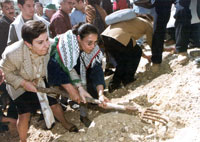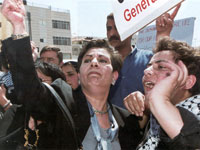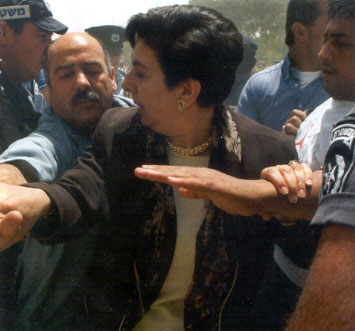|
Woman of Distinction Exceedingly articulate, speaking in rapid, unambiguous sentences, she masterfully conducts press conferences and interviews, controlling the topics of discussion and dodging uncomfortable issues, cutting off what she considers are irrelevant questions. It is not difficult to see why Yasser Arafat, chairman of the Palestine Liberation Organisation (PLO), made Ashrawi a spokesperson for his cause. This does not perturb the politician at all, who admits she has always been ‘a troublemaker’ – one who is not prepared to simply accept the ‘norm’ but constantly questions decisions which affect her life, her country and her people. As she said in a speech to college students in America last year: “It’s become quite acceptable to talk about peace and human rights. It was quite dangerous when we started out. The problem is – and it’s not a problem to me – is that I’ve always been a troublemaker.” Outspoken The self-confessed ‘troublemaker’, discovered early on in life her need to fight against the injustices she saw around her. Born in Nablus on the West Bank into a politically active family, Ashrawi was educated at the American University in Beirut. Hanan Ashrawi is the youngest daughter of the late Daud Mikhail, a wealthy physician, an atheist with a Christian background, and a feminist. Her mother is Anglican, two aunts are Catholic nuns, another is Greek Orthodox, and her uncle is Baptist. Her sister married a Muslim – an act unheard of ten years ago.
So during the remainder of her studies, the resilient young scholar supported herself in Beirut, then left Beirut and travelled to the University of Virginia, in America, in 1970 to do graduate work in a doctoral programme in medieval studies. In September 1973, one month before the Yom Kippur War, the military governor granted a permit for her to resettle indefinitely in Ramallah. Returning to the West Bank in 1973 at the age of 26, Ashrawi was offered a plum position: chairwoman of the English Studies department at the old Anglican Teacher’s College in Bir Zeit. Ashrawi headed a department that was authorised to grant doctoral degrees even though she did not receive her own until years later.
Ashrawi herself dismisses such observations and says that she has never lost track of the importance of the human struggle of the Palestinian people: “The essence of the Palestinian tragedy, is, of course, the human dimension; the fact that there was a systematic attempt at the negation, dispossession, dispersion of a whole nation and a denial of those people of their rights to natural continuity and life on their homeland, of their right to their own identity, of the right to their own history, of their right to their own home and lands. “So any solution to the Palestinian question and any attempt at achieving a genuine peace has to address that core ‘ human issue from, first of all, a recognition of the facts and the identity and also firmly based based on an international law and legality.” Entering the political battle field Hanan Ashrawi first became a presence on the international scene when, in a 1988 ABC Nightline debate moderated by Ted Koppel, where she joined other Palestinian leaders in a first-ever public confrontation with Israeli counterparts. She spoke crisply and concisely of the Palestinian cause, presenting a striking image of the new Palestinian leadership. She began receiving more invitations to speak than she could accept, but her new status only emphasised her confinement under the occupation. When travelling abroad, she was regularly strip-searched at airports and border crossings. Between 1991 and 1993 she served as a spokesperson for the official Palestinian delegation at the Madrid peace negotiations. Her arguments and pragmatic appeals for understanding on behalf of the Palestinians nearly overshadowed Israeli Prime Minister Yitzhak Shamir and President Bush, and upstaged future Israeli Prime Minister Benjamin Netanyahu. Widely respected by Christians and Muslims, Ashrawi has frequently confronted President Arafat in her efforts to democratise the Palestinian self-rule government. For several years, Ashrawi made sure that no cameras were present when she met with Arafat and PLO members in Tunis. Upon her return to the West Bank, she would deny, to everyone's satisfaction, that the meetings had taken place. But in June 1992 she ended the game, meeting Arafat in Amman in a well-televised meeting. In a now famous photograph, she rests her head on Arafat's shoulder in submission, and perhaps apology. Land Rights
The primary focus is, of course, Jerusalem. It is claimed as holy city or territorial possession by a host of peoples and religions, whose attachments are so passionate that no hope of organising a cooperative governing body seems possible. Ashrawi cuts to the heart of the matter. “Jerusalem,” she says, “is a terrestrial city, not a celestial city.” Musing on the situation, she provides a quick review of Jerusalem’s occupiers: the Greeks, the Romans, Arabs, Palestinians,Christians; builders of Byzantine churches that are everywhere. “You can’t lay exclusive claim to Jerusalem,” she says, “and you shouldn’t destroy to rebuild. Go back to tolerance – Jerusalem as an open city with access to all.” She has suggestions; she has options. The listener thinks, hearing Ashrawi, how sensible. Couldn’t this be implemented? But this is part of the peace process, and no one knows better the snags and pitfalls that this process entails. “The peace process is not there to prepare the ground for future conflict. It is not the capitulation of the the weak or the exploitation of the weakness of the weak by the strong. It is the vindication of the suffering of the weak in order to over come it, in order to find genuine solutions, and in order to effect historical reconciliation which will empower the weak and create a situation of human parity based on international legality that would bring about a peace that can lay claim to permanence and justice,” said Ashrawi recently in an impassioned speech. In the introduction to her 1995 book, This Side of Peace, Ashrawi reminds us that she is but one voice that has taken the liberty “to convey a reality larger than myself. The narrative cannot be detached from the narrator. Nor can the first person singular pronoun replace the plural in the composite experience of a nation. Such is the human context and therein lies the substance.” Family Life Ashrawi's greatest admirer is her husband Emil, a burly, bearded man, four years younger than she and her exact opposite. The ninth son of a poor family and barely a high school graduate. A photographer with the United Nations headquarters in Jerusalem, he picks up their daughters, Amal and Zina, from school. When Hanan is travelling, the girls stay tuned to the television, hoping to see their mother on the news. Emil and Hanan met at a party shortly after her 1973 trial. He recalls: “this beautiful girl in a miniskirt, with hair falling over her shoulders, who was talking to everybody.” He was intimidated by her education and reputation, but she told him that she had cried at a rock concert in which he'd played drums. They talked all night. In August 1975, they married at the Anglican Cathedral of Jerusalem. As time went by, he realised that she was married less to him than to her people's cause. Nothing represents her dedication to this cause more than the answer given to one journalist who asked Ashwari, will there ever be peace in the Middle East? “In the moment that I give up hope, I will not be in the peace process,” Ashrawi answered. “If we lose faith, there will be no peaceful solution to the conflict. Peace will be very difficult and very painful, but I think we have to do it. “We are not going to relinquish our right of return. Many of you would say ‘well you are not a refugee. Why do you speak out?’ I am speaking out because we are all firmly committed, first of all to the human unity of the Palestinian people and nation. We are one people, one nation, and a solution has to address all people.” |
 Hanan Ashrawi is well-known in the worlds of politics, diplomacy, and conflict resolution as the spokesperson for the Palestinians in the Occupied Territories, and as a member of the Palestine Liberation Council, and former Minister of Education in the Palestinian Authority. She is also, in addition to being a scholar, the secretary general of the Palestinian Initiative for the Promotion of Global Dialogue and Democracy.
Hanan Ashrawi is well-known in the worlds of politics, diplomacy, and conflict resolution as the spokesperson for the Palestinians in the Occupied Territories, and as a member of the Palestine Liberation Council, and former Minister of Education in the Palestinian Authority. She is also, in addition to being a scholar, the secretary general of the Palestinian Initiative for the Promotion of Global Dialogue and Democracy.  She was a student at the American University of Beirut when the Six-Day War broke out in June 1967. The Israeli military government implemented a law defining anyone not home at the outbreak of hostilities as an ‘absentee’. Because absentees did not legally exist, Ashrawi was not allowed to return to
Ramallah.
She was a student at the American University of Beirut when the Six-Day War broke out in June 1967. The Israeli military government implemented a law defining anyone not home at the outbreak of hostilities as an ‘absentee’. Because absentees did not legally exist, Ashrawi was not allowed to return to
Ramallah. She immersed herself in the budding Palestinian revolution. She spoke, she marched, she did political theatre, and she attended parties at which nationalism flowed as freely as arak. She had promised to behave as a condition of her return, but she could not resist demonstrating. She was detained, tried, and made to choose between six months in prison and a US$120 fine. Her college faculty paid the fine. Others paid much stiffer penalties, but she would use the incident to prove that she, too, had suffered.
She immersed herself in the budding Palestinian revolution. She spoke, she marched, she did political theatre, and she attended parties at which nationalism flowed as freely as arak. She had promised to behave as a condition of her return, but she could not resist demonstrating. She was detained, tried, and made to choose between six months in prison and a US$120 fine. Her college faculty paid the fine. Others paid much stiffer penalties, but she would use the incident to prove that she, too, had suffered. Ashrawi has long laboured for Palestinian self-government during turmoil in her homeland, where the peace process that she helped launch frequently seems to move five steps forward, then six back. There are numerous and perpetual struggles in the Middle East; the one between the Israelis and the Palestinians centres on territory: its ownership, its occupation, its assignment, its future.
Ashrawi has long laboured for Palestinian self-government during turmoil in her homeland, where the peace process that she helped launch frequently seems to move five steps forward, then six back. There are numerous and perpetual struggles in the Middle East; the one between the Israelis and the Palestinians centres on territory: its ownership, its occupation, its assignment, its future.